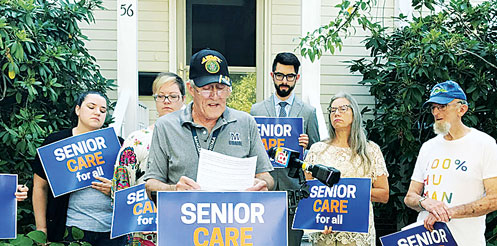We are proud to announce the launch of the CREATIVE CARE COUNCIL! LEARN MORE
We are proud to announce the launch of the CREATIVE CARE COUNCIL! LEARN MORE

This article originally appeared in The Free Press. Read it there.
The progressive group Maine People’s Alliance is spearheading a new referendum campaign to guarantee in-home support and assistance to all Mainers over 65 years of age and people with disabilities. The ballot initiative would establish the first-in-the-nation Universal Home Care Program, which supporters say would provide home care for 30,000 seniors and people with disabilities who require daily living supports in order to stay in their homes. The proposal would be funded with a tax on higher-wage earners.
“Every day, families across Maine are stuck facing the incredible stress of choosing between spending down their life’s savings on care for aging family members, quitting their job to provide that care themselves, or simply letting family members suffer without the care they need,” said Ben Chin, political engagement director for Maine People’s Alliance, at a press conference last week. “That’s why today we are proud to launch the Senior Care for All ballot measure to guarantee all seniors and Mainers with disabilities have access to in-home care.”
Supporters of the campaign note that it’s becoming increasingly difficult for two-income families to simultaneously take care of children and aging parents who can no longer live independently. In some cases, Medicaid will cover some long-term care supports, such as doctor and nurse visits and personal care services, but it has strict income eligibility guidelines that require people to spend down their assets to poverty levels in order to qualify. Medicare only covers some short-term care supports, such as temporary stays in nursing homes while recovering from surgery or an illness, but it does not cover long-term nursing support, homemaker services or personal care services.
Some patients use long-term care insurance, but the annual premiums have been steadily rising and average between $960 and $2,580 for a 55-year-old. Only 11 percent of adults had long-term care insurance in 2014, according to the Urban Institute. At the same time, half of older adults had less than $22,887 in yearly income, according to the Pension Rights Center. The long-term care insurer Genworth estimates that the annual cost of home care services in Maine is over $52,000, while a semi-private room in a nursing home is nearly $110,000 per year.
As a result, families often have to pick up the slack, as about half of the care is donated by family members and friends, according to a 2013 Congressional Budget Office report. The AARP estimates that nearly two-thirds of workers between the ages of 45 and 74 are caring for an aging spouse, parent or relative. It notes that half of those family caregivers of adults age 50 and older are employed full-time and another 11 percent are employed part-time. In total, AARP found that family caregivers contribute an estimated $470 billion worth of unpaid labor and value to the economy.
The “Senior Care for All” proposal was developed in partnership with the national advocacy group Caring Across Generations, which has identified Maine as a state with particularly high elder care needs given that the number of Mainers over age 65 is expected to double by 2030, according to state statistics. At the same time, 90 percent of people over age 65 say they would rather stay in their home than to go into an assisted-living facility or nursing home, according to an AARP survey.
If passed, the measure would also help fund in-home and community-based supports for 1,550 Mainers with severe disabilities — including cerebral palsy, multiple sclerosis, traumatic brain and spinal cord injuries, Down syndrome, autism and mental illness — who are currently on waiting lists for services. The measure also aims to boost pay for home care workers, because the industry currently suffers from chronic worker shortages, due in part to low wages.
The referendum would be paid for by a 1.9-percent tax on employee salaries and wages over $127,000 a year — once people earn in excess of that amount, they stop paying Social Security tax on those earnings. While proponents say the initiative will close that tax “loophole” for higher-income earners, the Maine Chamber of Commerce has vowed to defeat the measure, as it did with the 3-percent surtax on wealthy earners that passed by referendum last year and was then repealed by the Legislature.
“Maine’s business community opposes this new effort,” said Maine Chamber of Commerce President Dana Connors. “The impact of yet another proposed surtax on individuals and businesses — with an even lower income threshold than what the Maine Legislature wisely repealed over the summer — will make it harder for Maine to do business, compete and grow our economy.”
The citizen initiative will need to collect just over 61,000 signatures by early next year in order to appear on the 2018 ballot.